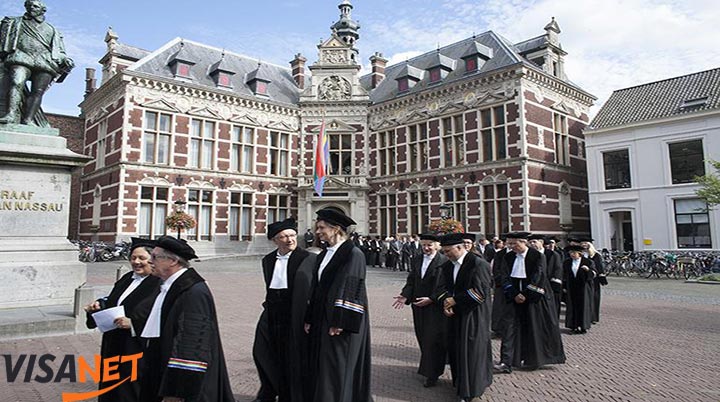بورسیه دکتری در زمینه سیستم های آب زیرزمینی دانشگاه اوترخت
Project title: Quantifying particle and contaminant transport, flow paths and travel times in groundwater systems using DNA-nanoparticles
A ۴-year PhD position, financed by the Dutch Science Foundation (STW), is available within the research project WaterTagging: DNA-nanoparticles for tracing and modelling water flows and travel times in natural systems. This project aims to develop and apply (1) innovative, robust, and environmentally friendly silica-protected iron oxide micro-particles tagged with artificial DNA to trace contaminant movement in natural water systems and (2) an innovative coupled model approach to capture dynamics in hydrological pathways and travel times and their effects on groundwater quality. The complete project consists of two PhD-positions and one Post-doc. Recently, a promising avenue for water science has seen the light: the development of inert DNA-tracers. The exceptional property of DNA-tagging is the infinite number of unique tracers that can be produced and their detectability at extreme low concentrations. Such tracers give the water sector a unique tool for in-situ mapping of transport of contaminants and (pathogenic) microorganisms in water systems and (alternative) drinking water production sites (e.g. groundwater, river bank filtration).
Objectives
To quantify the fate and behavior of the DNA-tagged microparticle in groundwater systems under a range of physico-chemical conditions in order to assess whether they can be used to determine travel times and spatial-temporal patterns of contaminant transport in groundwater and whether they may be used as surrogates for microorganisms to determine safe setback distances or adequate treatment by soil passage. The research entails laboratory and field scale experiments and comparing DNA-tracers behavior to a suite of contaminants, ranging from chemical compounds to microorganisms. Furthermore, the candidate is responsible for developing a combined monitoring-modelling approach to quantify spatial patterns in travel times towards drinking water wells.
Supervision
The research will be supervised by Prof Dr Jack Schijven (UU), Prof Dr Pieter Stuyfzand and Dr Arnaut van Loon (KWR) and Dr Jan-Willem Foppen (UNESCO-IHE). The overall project responsible is Dr. Thom Bogaard (TUDelft).
Locations
The work will be carried out at Utrecht University (Prof Dr Schijven), KWR (Prof Dr Stuyfzand and Dr van Loon) and UNESCO-IHE (Dr. Foppen).
Up to ten percent of your time will be dedicated to assisting in the BSc and MSc teaching programmes of the department. You and your supervisors will together set up a Training & Supervision plan for the additional education and supervision that you yourself specifically need.
Qualifications
The applicant should have a Master of Science degree in Earth Sciences, Hydrology, Physics or similar with a clear affinity with groundwater hydrology, contaminant transport, hydrochemistry. Experience in classical microbiological detection is desirable and willingness to this is essential. The applicant should have knowledge of modeling transport processes in porous media, some experience with laboratory and field experiments and be fluent in English. Also, a pro-active, open working attitude and willingness and capacity to work in a multi-disciplinary project is required. Affinity with the dissemination of scientific results towards stakeholders and basic knowledge about drinking water production in The Netherlands is strongly appreciated.
The candidate will participate in all meetings and workshops organized by the WaterTagging research group. The candidate disseminates results within the project during the meetings, but also and in particular through presentations at conferences and contributions to scientific journals.
Offer
The successful candidate will be offered a full-time position at first for one year. Depending on a satisfactory performance this may be extended to a total period of four years, with the specific intent that it results in a doctorate within this period. Employment conditions are based on the Collective Labour Agreement of the Dutch Universities. The gross monthly salary starts with €۲,۱۹۱ in the first year and increases to €۲,۸۰۱ in the fourth year of employment with a full-time appointment. The salary is supplemented by a holiday allowance of 8% per year and an end-of-year bonus of 8.3%. In addition, we offer a pension scheme, collective insurance schemes and flexible employment conditions. For more information visit Working at Utrecht University.
About the organization
A better future for everyone. This ambition motivates our scientists in executing their leading research and inspiring teaching. At Utrecht University, the various disciplines collaborate intensively towards major societal themes. Our focus is on Dynamics of Youth, Institutions for Open Societies, Life Sciences and Sustainability.
The city of Utrecht is one of the oldest cities in the Netherlands, with a charming old center and an internationally oriented culture that is strongly influenced by its century-old university. Utrecht city has been consistently ranked as one of the most livable cities in the Netherlands.
The Faculty of Geosciences conducts education and research concerning the geosphere,biosphere, atmosphere and anthroposphere. With a complement of 2,600 students (BSc and MSc) and 600 staff, the faculty is a strong and challenging organisation. The faculty is organised in four departments: Innovation, Environmental & Energy Sciences, Earth Sciences, Physical Geography, and Human Geography & Urban/Regional Planning.
The Department of Earth Sciences conducts teaching and research across the full range of the solid Earth and environmental Earth sciences, with activities in almost all areas of geology, geochemistry, geophysics, biogeology and hydrogeology. The department hosts a highly international group of more than 100 PhD students and postdoctoral researchers and houses a wide variety of world-class laboratories.
The research of the Hydrogeology Group is multi-disciplinary and multi-scale. It concerns the flow of fluids, transport of reactive solutes, colloidal particles, and heat, as well as electrokinetic effects, in (highly) deformable porous media. It commonly consists of a combination of theoretical, computational, and experimental studies.
Additional information
Informal enquiries may be sent to Prof Dr Jack Schijven (jack.schijven@rivm.nl) and/or Prof Dr Pieter Stuyfzand (Pieter.Stuyfzand@kwrwater.nl), Dr Thom Bogaard (T.A.Bogaard@tudelft.nl)
Apply
Applications will be accepted until the position is filled, but we prefer to receive your application by January 15, 2017. Evaluations and interviews are planned soon thereafter. We seek to initiate the position as soon as possible and not later than May 15, 2017.
 کنکوری کنکوری تدریس معلم خصوصی در منزل از ابتدایی تا دبیرستان ریاضی فیزیک زیست در تهران
کنکوری کنکوری تدریس معلم خصوصی در منزل از ابتدایی تا دبیرستان ریاضی فیزیک زیست در تهران

